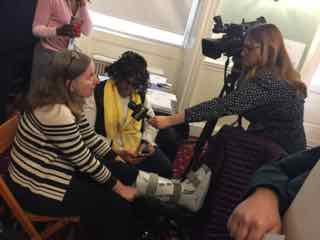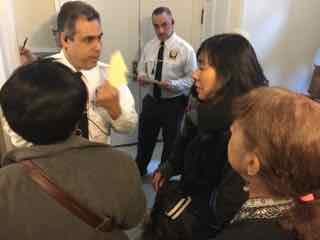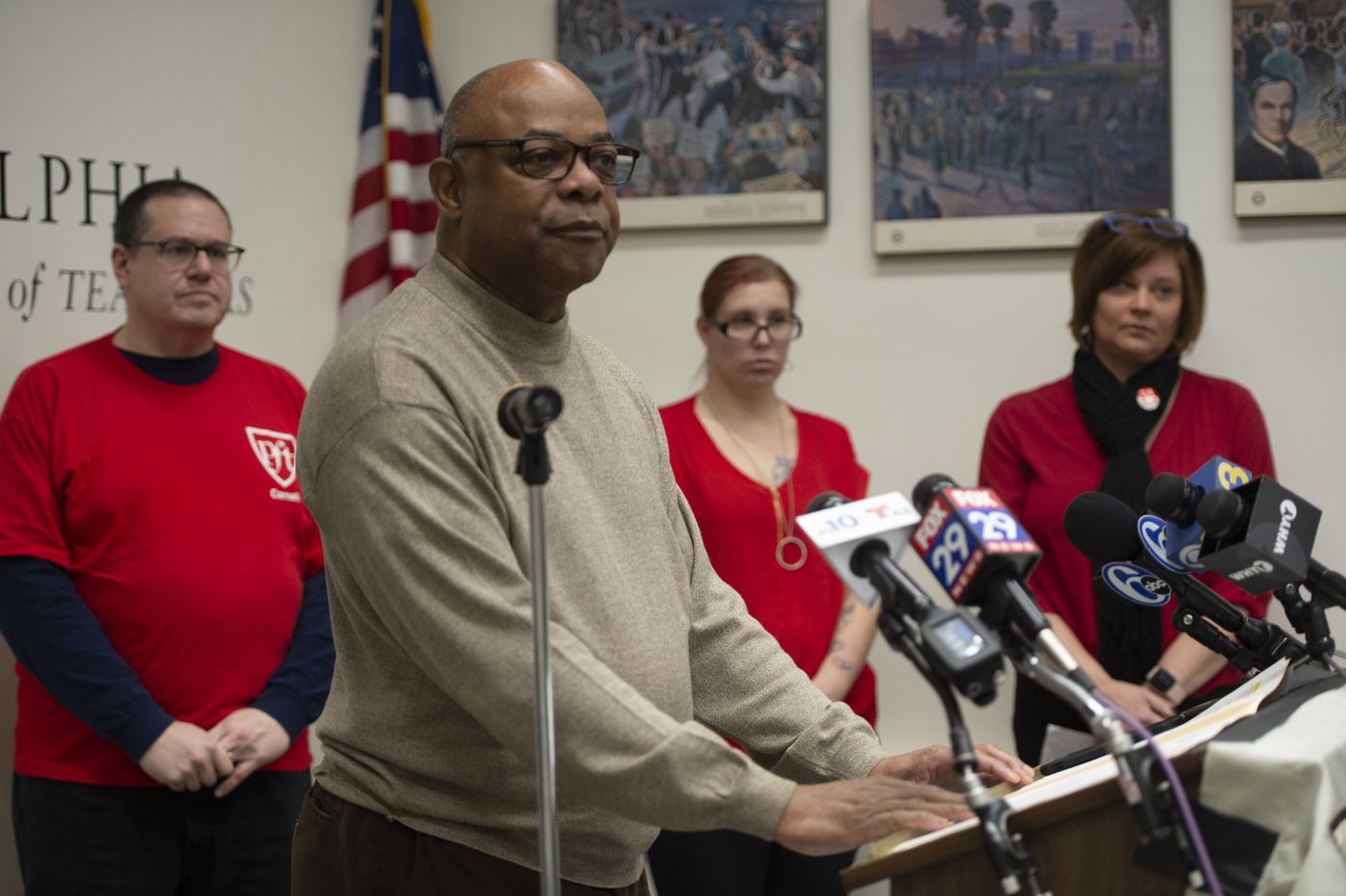 |
| Leonie Haimson doesn't allow a broken ankle to keep her away |
I attended the hearing Friday from 11 AM until it ended almost at 4. Leonie reports below in full on the day. I was supposed to go on a class trip with to the NY Historical Society but the teacher got sick and I decided to head down to the hearing. Gloria Brandman was already there but still in the hallway - she didn't get to speak until after 3 PM. I think current and ex-teachers have real world stories to tell from the long-range career perspective.
Leonie reported: When Chair Treyger asked
her what number she would give to the importance of class size from one to ten,
she refused to say. It was clear after questioning that the Quality Reviews that
DOE officials carry out and that are supposed to highlight for principals what
changes are needed in their schools never mention class size. I'd love to see Goldmark in a class.

A bunch of us were out in the hall for an hour because the room was filled to the brim. We missed the misleading and open lies told by DOE officials who defended their policies. One of them, Deputy Chancellor Karin Goldmark was quoted in the Chalkbeat
article which claimed she had been a teacher. I wonder for how long she taught - and she makes around 220k a year.
The great Mark Treyger, the Ed committee chair, handled all these hours of testimony with grace and dignity, in addition to chiming in so many comments relating to his own teaching experiences. Former teacher and ed chair Danny Dromme was also present for part of the hearing, but through the afternoon the room thinned out considerably. Having political people who were teachers for more than 10 minutes is important.
I was not intending to speak but there to support Leonie, but as the hearing was ending she suggested I take the final slot to speak. With nothing prepared I still figured that I had enough experience with the class size issue to fill 3 minutes of time. There were about 5 people in the room to hear it. I barely remember what I said but Leonie did tweet out some of it -- maybe I'll look it up and put up some of my points later.
 |
| court officer explaining to crowd outside hearing |
Leonie reports:
Today, from 10 AM to 3:45 PM, the City Council Education Committee
held hearings on class size at City Hall.
So many people showed up to testify that it was standing room only in
the Committee hearing room. It was so
overcrowded that City Hall guards did not allow many of the parents and advocates
to had planned to testify enter the room,
and many left before they had a chance to speak.
First, Chair of the Education Committee Mark Treyger, a
former teacher himself, opened the hearings by saying that “Unfortunately,
efforts to reduce class size in New York City public schools haven’t gotten
very far despite all the passion & hard work of parents, advocates,
teachers & students - including many here today.” Indeed class sizes have risen substantially
since NY state’s highest court said that class sizes in NYC schools were too
large to provide students with their constitutional right to an adequate
education.
Chair Treyger questioned Karin Goldmark , Deputy Chancellor of
the NYC Department of Education, and Lorraine Grillo, President of the School
Construction Authority, asking if they prioritized reducing class size as a
goal. Goldmark was non-committal, saying
that though the DOE realized the
research shows that smaller classes do lead to better student outcomes, there
is a lack of resources and NYC schools have many needs. When Chair Treyger asked
her what number she would give to the importance of class size from one to ten,
she refused to say. She also said she didn’t know if the DOE had ever tried to
analyze the results to see if smaller classes were correlated with student
success, and she did not know if Edustat or any of the other data systems that
the DOE currently uses or plans to use in the future even capture class size as
a critical factor. It was clear after questioning that the Quality Reviews that
DOE officials carry out and that are supposed to highlight for principals what
changes are needed in their schools never mention class size.
Then scores of parents, former teachers, students, advocates,
education leaders, professors, school service providers and representatives
from community based organizations testified from their own experience how NYC
students are deprived of a quality education and a better chance to learn because
of class sizes out of control. Many
urged the City Council to ensure that at least $100 million is allocated for
class size reduction in next year’s budget, as the first step towards providing
an equitable education for the city’s students.. All children benefit from smaller classes,
the research shows, but especially those children from low-income families,
students of color, English Language Learners, and students with special needs,
which together make up the majority of NYC public school students.
Kathleen Cashin, former NYC Superintendent and now a member
of the NY State Board of Regents from Brooklyn, observed: “In 1999, when
I was Superintendent of District 23 in Ocean Hill Brownsville, the fourth
graders had to take a multi-faceted state test for the first time, including
reading, writing and listening. The
first thing I did was to reduce class size in that grade to 16 to 20 students
per class. The results were astounding.
The children in one of the poorest districts in the nation had the
greatest growth of any district in the city.
The key initiative that caused this substantial growth, I believe, was
lowering their class size. Teachers were
able to manage their classes better, which caused them to gain confidence, and
encouraged them to collaborate with each other.
This in turn, strengthened their professionalism and skills.” She added, “When you reduce class size,
everything changes. The world changes.”
"Class size is one of the reasons I helped start the
Campaign for Fiscal Equity back in 1993, seeing how overcrowded the schools in
District 6 were during my time as president of the board," said State Senator
Robert Jackson. "I understand some of DOE's resistance to hiring more
teachers comes from fiscal concerns. That’s why I’m committed to fully funding
the Foundation Aid formula at the state level. I’ve introduced a bill that adds
a new bracket to increase income tax on New York’s highest earners, generating
an estimated $4.5 billion in revenue. But the DOE has to commit to use that in
adherence to the Contracts for Excellence," Senator Jackson added, which
requires NYC to implement class size reduction.
Joshua Aronson, NYU Professor of Psychology and Education
explained: "I have visited many schools in NYC and elsewhere in the
nation. Manageable class sizes aren’t sufficient to fix our schools. But from
my personal observations as well my analysis of the research, I believe small
class sizes may be necessary to creating the a powerful school culture,
especially in underserved populations, that students need to succeed. All
children can become eager, curious learners, but only when their key physical
and social needs are met. This takes time, care, compassion— and most
importantly—small class sizes. When a school offers small classes it can
accomplish what others can only dream of. Reducing class size is expensive on
the front end, but the benefits will soon outweigh the costs in my opinion, and
in the opinion of nearly every teacher and principal I have ever met."
Tiffani Torres, a senior at Pace HS and a member of Teens Take Charge, said:
“Having been in both small and large classes, I know first-hand the difference
between both. In smaller classes, I can
ask questions without fear of distracting 30 other students, and can receive
more one- on- one help from my teachers.”
She talked about how many students had dropped out of her calculus class
because it was too large, and how many of those who remained were confused
because of the lack of focused feedback and support from her teacher. Both she
and Lorraie Forbes, another student, said that they would give class size a ten for its importance for
student learning and engagement.
Jacqueline Shannon, Associate Professor and
the Department Chair of Early Childhood and Art Education at Brooklyn
College, said: “In 2014, I helped write a letter to then-Chancellor Farina,
warning her that increases in class size that had occurred since 2007 in NYC
public schools, particularly in the early grades, threatened to undermine the
gains one might otherwise expect from the expansion of preK. Our letter was signed by over 70 professors
of education, psychology, and sociology. Since then, the city has made very
little progress in lowering class sizes.
The number of children in Kindergarten in classes of 25 or more has
risen by 68% since 2007, and the number
of 1st through 3rd
graders of thirty or more has increased by nearly 3000%. While the Mayor should be thanked for
expanding preK and now 3K, early childhood education does not end at age
5. The city should now focus on lowering class sizes in our public
schools.”
Shino Tanikawa, the co-chair of the Education Council
Consortium, which represents the parent-led Citywide and Community Education
Councils in NYC, said, “It has been nearly twenty years since the landmark CFE
decision, which mandated smaller classes for NYC schools. Although the
City submitted a class size reduction plan, it was abandoned by both the DOE
and the NYS Education Department, and instead our schools experienced a sharp
increase in class sizes across the city. The Chancellor has been pushing
for school integration but we must reduce class sizes for integration to
succeed. Class size reduction is an urgent need that cannot wait. “
“I’ve worked in many schools and know from my own personal
experience that class sizes should be smaller to give students a better chance
at success,” said Evie Hantzopoulos, Executive Director of Global Kids and
public school parent. “Research proves
that this simple strategy helps all students, and especially our most
vulnerable ones, achieve the positive learning outcomes needed for the 21st
Century.”
State Senator Brad Hoylman,
whose statement was read for him by a staffer, observed : “On average, NYC
public school classrooms have 10-30% more students than elsewhere in the state.
As the elected representative for thousands of families with young children, I
know reducing class size is a primary concern. My constituents — and every
child in New York — deserve the opportunity to succeed in school, and class
size is an integral factor in determining student success. I’m proud to stand
with my colleague Senator Jackson and Class Size Matters in support of reducing
class size in New York.”
Tanesha Grant, a member of the Community Education Council
in District 5 as well as AQE and CEJ, stated:
“Class size has grown tremendously since 2007 in our schools, which has
a deep impact on the quality of education our children receive. This
impacts black and brown students the hardest. Our children are given hurdles to
jump over to just to get an equitable education. As a black mother of
three and grandmother of an autistic grandson, I know class size matters. I see
how it affects my children’s learning. The data proves that class size
MATTERS!”
Parent advocate Johanna Garcia and plaintiff in the class
size lawsuit launched by nine NYC parents, Class Size Matters and AQE that was argued
in the Appellate court last month said: "Class size matters. It’s a simple
idea, and it’s one of the single most effective tools we have to improve the
quality of the education our children receive. As a Black and Latina parent
advocate, I understand the failures to reduce New York City class size to be a
huge factor in educational racism because it has detrimental effects on a
student body that is 85% Black and Brown and predominantly working-class. If we
are serious about addressing that educational racism, we must get serious about
class size in our schools. We have to be honest about the problems and
clear-eyed about implementing the solutions going forward. Let's count our
students fairly and hire more teachers in line with the law so our
children get the quality education they deserve."
Nearly half of all middle school
students are in classes of 30 or more; and more than half of high school
students are in classes thirty or more. Jessica
Siegel, a professor at Brooklyn College and a former teacher, recounted what
one middle school teacher had told her about how she felt being unable to give sufficient help to all
her students: “My largest 8th
grade class is a whopping 37 students. I teach two more classes, one with 32
and the last one with 28. Both include English Language Learners and students
who require push in services for their Individualized Education Plans. I feel
as though I’m being torn to shreds when I’m helping others, their eyes hungry
and ready and yet there you are unable to reach them. It’s as if you have one
life raft and must choose which child gets saved. It’s heart wrenching and
demoralizing.”
Elsie McCabe Thompson,
head of the Mission Society, one of the nation’s oldest social service
organizations, testified that they see thousands of children
in poverty. One third have diagnosed special needs; but most have suffered
trauma. Smaller classes are important for ALL these children, she said, because
as a teacher, “you cannot authentically have high expectations for kids that
you do not know.”
A statement was
read on behalf of Diane Ravitch, eminent historian and education advocate: “The
single most effective way to improve instruction is to reduce class
size. The benefits of class size reduction are greatest for the neediest
students. . If you are serious about helping children, reduce class
size. If you are serious about helping teachers to be more effective,
reduce class size. Reducing class size is more effective than test prep;
it is more effective than hiring coaches and consultants. It is more effective
than buying new hardware and software. It is more effective than any of
the many other "reforms" that have been imposed by the federal or
state government. New York State's scores on national tests have been
flat for twenty years. It is time for fresh thinking. Do what works!
Reduce class sizes!”
For data on current
class sizes in NYC schools and trends, as well as the research on class size,
check out www.classsizematters.org












